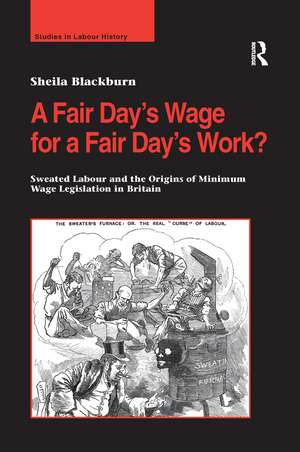A Fair Day’s Wage for a Fair Day’s Work?: Sweated Labour and the Origins of Minimum Wage Legislation in Britain
Autor Sheila Blackburnen Limba Engleză Paperback – 28 oct 2016
| Toate formatele și edițiile | Preț | Express |
|---|---|---|
| Paperback (1) | 469.34 lei 6-8 săpt. | |
| Taylor & Francis – 28 oct 2016 | 469.34 lei 6-8 săpt. | |
| Hardback (1) | 1056.28 lei 6-8 săpt. | |
| Taylor & Francis – 28 noi 2007 | 1056.28 lei 6-8 săpt. |
Preț: 469.34 lei
Nou
Puncte Express: 704
Preț estimativ în valută:
89.83€ • 92.58$ • 75.84£
89.83€ • 92.58$ • 75.84£
Carte tipărită la comandă
Livrare economică 03-17 martie
Preluare comenzi: 021 569.72.76
Specificații
ISBN-13: 9781138272484
ISBN-10: 1138272485
Pagini: 248
Dimensiuni: 156 x 234 x 13 mm
Greutate: 0.45 kg
Ediția:1
Editura: Taylor & Francis
Colecția Routledge
Locul publicării:Oxford, United Kingdom
ISBN-10: 1138272485
Pagini: 248
Dimensiuni: 156 x 234 x 13 mm
Greutate: 0.45 kg
Ediția:1
Editura: Taylor & Francis
Colecția Routledge
Locul publicării:Oxford, United Kingdom
Cuprins
Contents: Preface; Introduction; Part I Sweating Revealed, 1843- 90: The 'discovery' of sweated labour, 1843-50; The 'rediscovery' of sweating, 1876-90. Part II The Search for an Effective Solution: Anti-sweating campaigns, 1890-1905; The turning point of 1906 and the legal minimum wage. Part III The Minimum Wage in Practice: The test case of the 1910 Cradley Heath dispute; R.H. Tawney and the minimum wage; The persistent problem of low pay; Conclusion; Appendices; Bibliography; Index.
Notă biografică
Sheila Blackburn is Lecturer in Labour Conditions and Modern Social Policy at the University of Liverpool, UK.
Recenzii
’Sheila Blackburn has written an excellent and timely study of sweated labour in the nineteenth and twentieth centuries...This book is rich in both primary material and reinterpretation. A short review cannot do justice to it, but it is essential reading for those who wish to discover the wider, rather than narrow, world of the ’sweated trades’.’ History ’Blackburn has produced a study that will be a key text for students and historians interested in British labour, gender relations and working-class politics since the nineteenth century. Its timely appearance and attempt to address contemporary questions about economic and social development should also secure it an audience within the wider social sciences and beyond.’ English Historical Review ’Blackburn is an undoubted expert on the history of sweated labor, and this richly detailed and erudite exploration is the product of careful and imaginative research. Her nuanced analysis demonstrates the complexity of the much misunderstood subject of sweating and the serious limitations of previous interpretations. ... Blackburn’s book will be of huge value for those wishing to deepen their understanding of the conceptual and practical dimensions of worker exploitation and of the range of working practices and forms of industrial organization in English industrial society.’ Journal of British Studies ’The year 2009 marks the centenary of the introduction of minimum wage legislation in Great Britain in the form of the Trade Boards Act 1909. This splendid book by Sheila Blackburn is the best possible tribute to the centenary. ...Sheila Blackburn has produced a magisterial research monograph in the very best traditions of social investigation. She deals with an important issue, brings many different methods of investigation into play, nicely mixes primary and secondary source material and ” above all ” has an empathy with the topic and with low-paid workers.’ British Journal of Industrial Relat
Descriere
Adopting a broad national and long-run approach, this book examines the issue of sweated labour and the legal control of low pay in Britain between 1840 and 1930. It explores the definition of sweated labour and the forces that generate it, as well as tackling the image of the sweated labourer and how it has changed over time. Having focused on these issues, the book then looks at how the problem was dealt with and analyses the success of reforms aimed at eradicating the practice.









